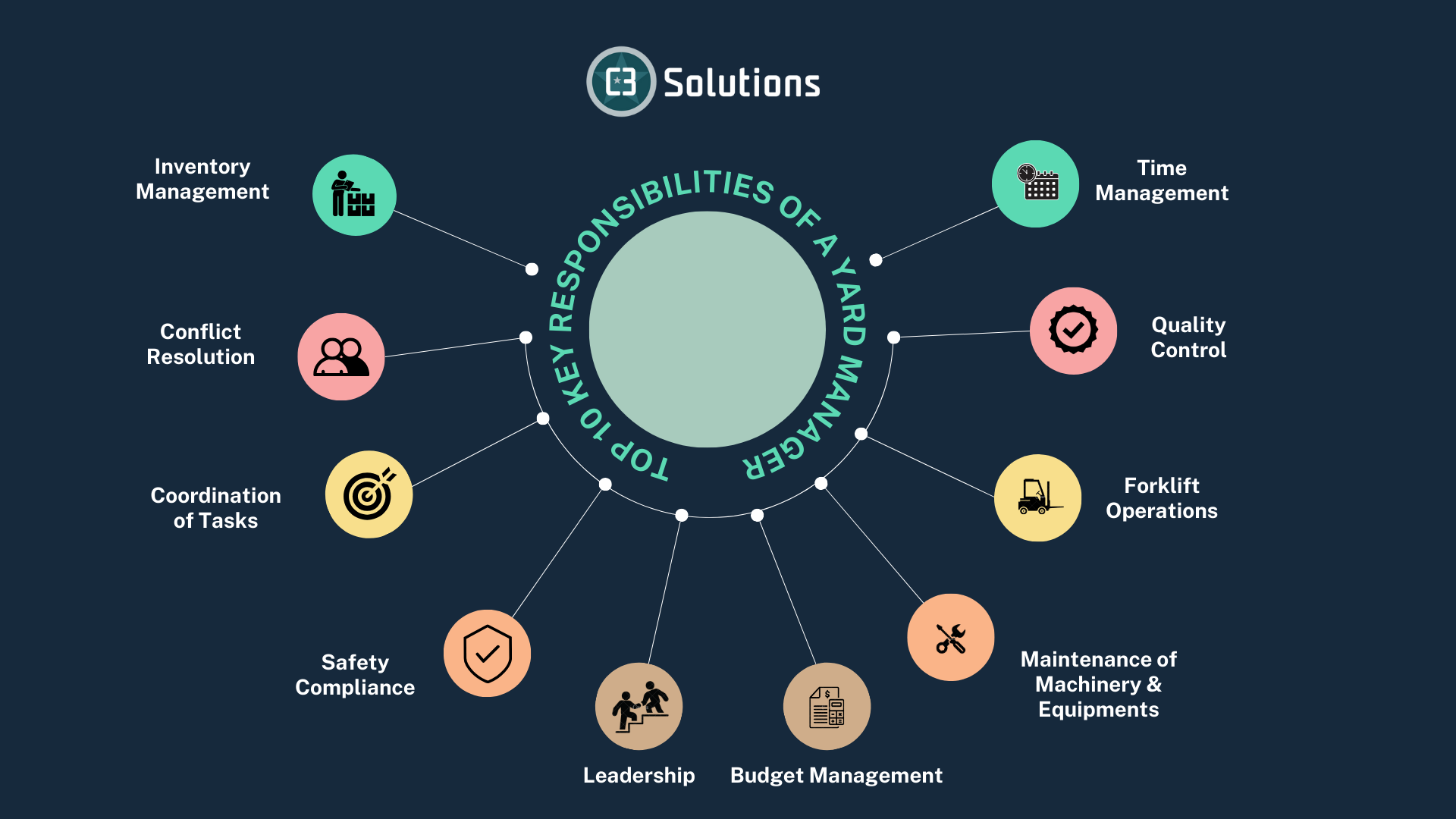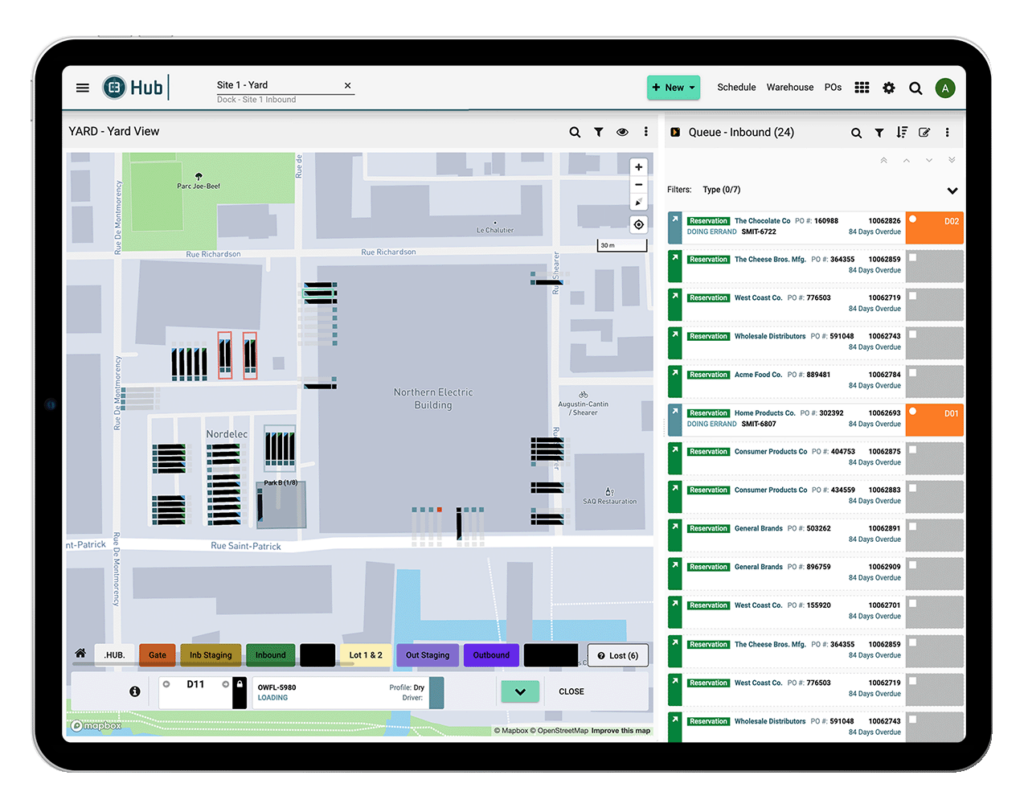5 Essential Steps to Excel as a Yard Manager

Managing a large yard in a warehouse is a huge responsibility, often undermined by the bias for action. A yard manager must know how his role impacts the overall chain.
Yard management is crucial in managing and operating a company's Yard, including activities related to storage, movement, and management of items, tools, and resources.
Let us understand the top 10 key responsibilities of a yard manager and the skills necessary for it:
-
Inventory Management: A Yard Manager must ensure all yard items are well-accounted for, organized, and accessible at all times.
This involves reducing inventory pilferages or damages, maximizing storage space utilization, and maintaining accurate records of inventory movements.
These activities help keep the sanity of the overall supply chain operations, reducing turnaround time and improving efficiency.
-
Coordination of Tasks: Yard Managers must monitor and coordinate various activities within the Yard.
These include scheduling deliveries, managing employee shifts, and overseeing equipment utilization and maintenance.
Effective scheduling and coordination ensure that all tasks are executed efficiently.
It minimizes conflicts and downtime and boosts overall productivity.
-
Safety Compliance: Ensuring compliance with safety standards is a major responsibility of a Yard Manager.
This role includes implementing safety procedures to prevent accidents and injuries.
Preventive safety actions and adherence to safety protocols can protect the company from legal issues and fines.
-
Leadership: A yard manager has to run the yard's daily operations, oversee teams, and ensure compliance with safety procedures while achieving operational goals.
Strong leadership skills enable a Yard Manager to delegate responsibilities effectively, motivate teams, resolve conflicts faster, and promote a positive work environment.
-
Maintenance of Machinery & Equipments: A Yard Manager must also oversee the upkeep of machinery and equipment to prevent untimely breakdowns and interruptions.
The yard manager must ensure that the focus on preventive maintenance is top-notch.
This responsibility also reduces operational costs and maintains high safety standards.
-
Forklift Operations: Forklift operations involve coordinating the movement of large volumes of materials or goods within the yard or warehouse.
Managing forklift operations is crucial for maintaining safety and productivity, and it also demonstrates the manager's deep understanding of their team's daily operations.
-
Quality Control: The yard manager must be the quality champion for his team.
The role involves significant quality control duties to ensure that all yard operations are conducted efficiently, safely, and effectively.
This includes inspecting equipment and materials for possible faults and taking preventive or corrective actions.
-
Conflict Resolution: Yard Managers often manage diverse teams and coordinate with internal and external stakeholders.
This can often lead to conflicting situations and priorities. Effective conflict resolution skills are necessary to maintain smooth operations and a harmonious work environment.
-
Time Management: Simultaneously managing multiple teams and prioritizing each of them requires excellent time management skills.
This ability helps ensure all activities are completed on schedule, enhancing productivity and reducing costs.
-
Budget Management: Last but not least, effective budget management is essential for a Yard Manager.
The yard manager must allocate funds for staffing, equipment purchases, and yard maintenance without exceeding financial budgets.
This skill is crucial for maintaining operations within the set budget, optimizing resource use, and achieving cost savings.
A yard manager plays a pivotal role in a company's yard's logistics and operational framework.
However, this requires diverse skills, from practical abilities like inventory management to soft skills like leadership and conflict resolution.
These capabilities are essential for the smooth and efficient running of yard activities.
However, to raise the bar higher, yard managers must also train themselves and their teams for next-gen capabilities.
They must keep pace with the ever-evolving supply chain and logistics best practices to build a core distinction for their supply chain over the competition.
Here are five steps on how yard managers can excel in their roles.
5 Steps to Excel as a Yard Manager
Becoming a leading and star yard manager involves much more than overseeing the daily operations of a warehouse or distribution center's yard. It requires strategic insight, operational acumen, and a deep understanding of improving supply chain efficiencies.
Excelling in this role can significantly impact your company's logistics and supply chain, enhancing overall productivity and profitability. Here are 5 simple yet powerful steps to master your duties as a yard manager and positively influence your company's supply chain trajectory.
1- Optimize Layout and Flow
The yard's layout determines the ease and speed of completing tasks. An optimal layout minimizes movement and saves time, significantly reducing costs and increasing throughput.
Hence, the yard managers must focus and reassess their yard's layouts. Running what was handed over is insufficient to bring efficiency to the yard.
How to Implement:
-
Conduct a Thorough Assessment: Regularly review your yard operations' current layout and flow. Create a process map to visualize the process. Look for bottlenecks and areas where processes can be streamlined.
-
Adopt Lean Principles: Utilize lean management techniques to organize the yard efficiently. This includes clear signage, designated areas for different types of goods, and minimizing distances between drop-off and pickup points.
-
Utilize Technology: Implement management systems like Yard Management Systems (YMS) that provide real-time data to help make informed decisions about space utilization and vehicle scheduling.

2- Leverage Technology for Enhanced Visibility
Technology can transform yard management by providing greater visibility into every aspect of yard operations. While there have been high investments in other parts of the supply chains, investments in yards have not been a priority so far.
But now, the companies realize their importance and should be supported by sharp focus from the yard managers.
How to Implement:
-
Implement a YMS: A robust Yard Management System can integrate with existing Warehouse Management Systems (WMS) and Transportation Management Systems (TMS) to provide a holistic view of logistics operations.
-
Use IoT Devices: Equip your Yard with IoT sensors and RFID tags to monitor equipment and cargo in real-time. This setup helps track goods' movements and conditions, ensuring they are handled correctly.
-
Data Analytics: Use data analytics from these integrated tools to analyze operations and identify trends and bottlenecks.
3- Develop and Train Your Team
A properly trained team is crucial to the functioning of any yard. Training enhances capability, morale, and productivity.
Equipping your teams with these new tools and processes will allow them to make data-informed decisions -- boosting yard agility and accuracy.
How to Implement:
-
Regular Training Programs: Conduct training sessions to keep all employees up-to-date with the latest operational standards and technologies.
-
Performance Incentives: Implement an incentive program to encourage productivity and reward efficiency.
-
Team Building: Regular team-building activities can improve communication and cooperation among staff, which is essential for a cohesive working environment.
4- Implement Rigorous Safety Standards
Safety is paramount in yard management. One wrong decision or incident can lead the whole warehouse or overall supply chain into a downward spiral.
A safe working environment prevents accidents, reduces downtime, and maintains high worker morale.
How to Implement:
-
Conduct Regular Safety Audits: Ensure all equipment is regularly checked and safety protocols are followed.
-
Safety Training: Provide ongoing safety training and updates to all staff to ensure they know and can implement safety standards.
-
Emergency Preparedness: Develop and regularly update emergency procedures to handle accidents effectively.
5- Foster Continuous Improvement
The logistics field is dynamic, and continuous improvement is critical to maintaining competitiveness and efficiency in operations.
Working with your teams and partners, such as 3PLs, can help the yard find newer efficiencies.
How to Implement:
-
Feedback Systems: Implement systems to collect employees' feedback on operational issues and potential improvements.
-
Stay Informed: Keep up with industry trends and innovations that can be applied to improve yard operations.
-
Review and Revise: Regularly review processes and implement changes based on data-driven insights and employee feedback.
Build the yard of the future with C3 Solutions
Being an excellent yard manager entails more than simply managing daily activities. It involves planning, using the newest technologies, being safe, and developing a culture of improvement.
The tactics we covered will help you shine in your present position and create a solid base for more career growth.
If you want a partner to support you on yard technology, C3 Solutions can be your go-to choice.
With rich technology and functional expertise, our focused yard and dock management solutions can help you transform your yard.
Contact C3 Solutions today to discover how our innovative Yard Management Solutions can help you streamline your processes, increase efficiency, and reduce costs.


